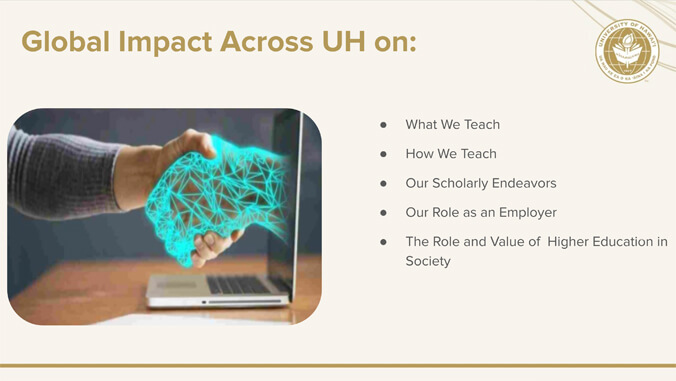
The University of Hawaiʻi is advancing a comprehensive, systemwide approach to becoming a leader in artificial intelligence (AI), with multiple initiatives underway at the system level and across the 10 campuses. President Wendy Hensel outlined the effort in a presentation to the UH Board of Regents on August 21 at UH Maui College, describing AI as a transformative force that will reshape education, research and the workforce in Hawaiʻi and beyond.
“Artificial intelligence has been compared to the invention of electricity,” said Hensel. “It doesn’t touch just one area, it touches all areas and will reform how we go about doing the work of just about everything, not only in the university but across society.”
Hensel acknowledged that some remain skeptical about AI’s reach but cited a familiar adage: people often overestimate the short-term effects of technology and underestimate its long-term impact.
“Most experts believe the scale of change we are seeing today will be more impactful than the industrial revolution,” she told regents. “The university should be a leader in moving Hawaiʻi through this moment.”
Imminent change and opportunity
The president cited predictions from top financial, business and tech firms to underscore the urgency: as many as 300 million jobs worldwide could be affected by generative AI, with 80% of the U.S. workforce expected to see at least 10% of their tasks impacted. It is also estimated that AI could add up to $4.4 trillion in value to the global economy, creating new opportunities and entire industries.
“Every single sector, from healthcare to education to government, is already being reshaped,” Hensel said. “This is not just about computer science. It touches agriculture, trades, finance and the careers that define Hawaiʻi’s workforce.”
AI across teaching, research and operations
Hensel said that UH is approaching AI on multiple fronts:
What we teach: ensuring every student, regardless of discipline, has the AI skills employers demand.
How we teach: incorporating tools such as AI-powered virtual teaching assistants and personalized learning content.
Research: accelerating discovery with new methods for processing vast datasets and building complex models.
Operations: using AI to improve efficiency across university systems and services.
Hensel emphasized that excellent AI-related work is already underway across UH’s 10 campuses, and a goal of the new initiative is for the system to harness those efforts, ensuring they are integrated, coordinated and able to benefit from scale.
“This is about preparing every learner, in every discipline, to thrive in an AI-driven world,” said Hensel. “Higher education is uniquely positioned to lead through this change, not only by teaching new skills, but by grounding innovation in ethics, cultural values and a commitment to equity.”
Building infrastructure and community partnerships
To guide this work, UH has created an AI Planning Group and appointed its first Chief Academic Technology Innovation Officer, informally dubbed the university’s “AI czar.” UH is pursuing partnerships with companies such as Google, Microsoft and IBM to provide professional development, along with other initiatives to connect students and the community.
UH Mānoa launched new academic offerings in fall 2025 including a Graduate Certificate in Applied Computing (AI/Data Science) and a Professional Master’s in Computer Science with an AI/Data Science track. Faculty on all campuses are also embedding AI assignments into existing courses, thanks to a summer incentive program.
“Our job is to lead Hawaiʻi through this transition,” said Hensel. “It is both frightening and exhilarating, but the University of Hawaiʻi is ready to seize the opportunity.”
Hensel said the AI presentation was part of a new effort to brief the Board of Regents at every meeting on proactive strategies as they develop.